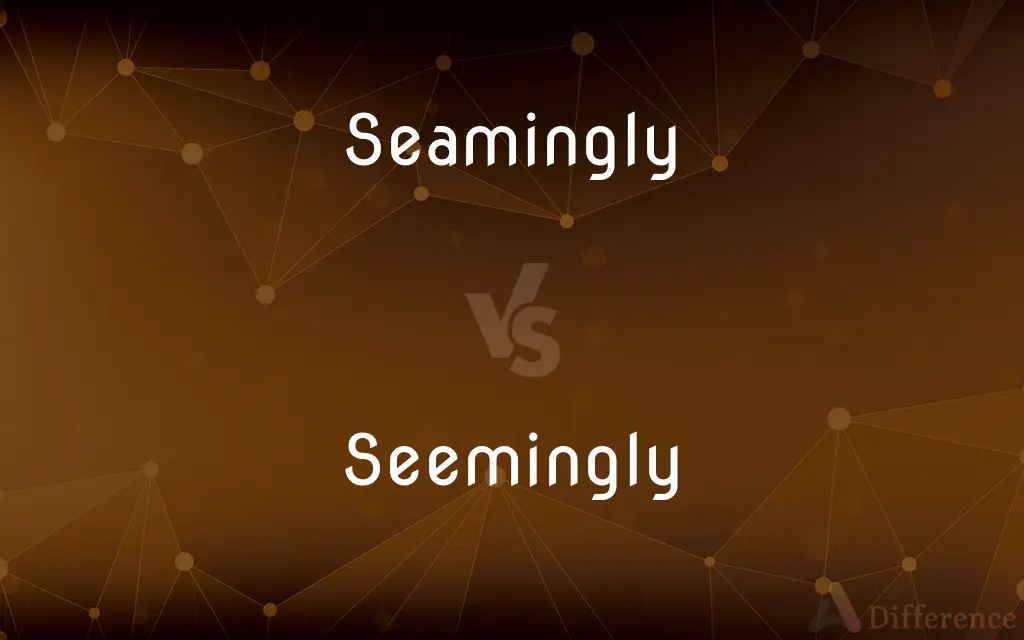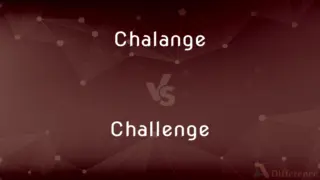Seamingly vs. Seemingly — Which is Correct Spelling?
By Tayyaba Rehman — Updated on March 30, 2024
"Seamingly" is incorrect; the correct spelling is "seemingly," indicating an appearance or impression of something.

Table of Contents
Which is correct: Seamingly or Seemingly
How to spell Seemingly?

Seamingly
Incorrect Spelling

Seemingly
Correct Spelling
ADVERTISEMENT
Key Differences
Link "seemingly" with "apparently" to remember its meaning and spelling.
The base is "seem" + "-ingly."
It does not have "a" after "seem."
Remember it starts with "seem" as in appearing to be.
Recall the adverbial "-ly" suffix.
ADVERTISEMENT
How Do You Spell Seemingly Correctly?
Incorrect: The task was seamingly easy, but it took much longer than expected.
Correct: The task was seemingly easy, but it took much longer than expected.
Incorrect: The weather was seamingly calm before the storm unexpectedly hit.
Correct: The weather was seemingly calm before the storm unexpectedly hit.
Incorrect: She was seamingly uninterested in the discussion, constantly checking her phone.
Correct: She was seemingly uninterested in the discussion, constantly checking her phone.
Incorrect: The solution was seamingly simple, but it was actually quite complex.
Correct: The solution was seemingly simple, but it was actually quite complex.
Incorrect: He was seamingly happy about the news, but I could tell he was upset.
Correct: He was seemingly happy about the news, but I could tell he was upset.
Seemingly Definitions
Seemingly can denote an appearance that can be deceptive.
It's seemingly a good deal, but read the fine print.
Seemingly means giving the impression of certain qualities.
The task was seemingly simple.
It is often used to describe something that is not confirmed.
Seemingly, the event will be postponed.
It suggests that something appears a certain way but might not be.
She was seemingly uninterested in the news.
Seemingly emphasizes the way something appears on the surface.
Seemingly unaffected, he continued his presentation.
Apparent; ostensible.
Outward appearance; semblance.
As it appears; apparently.
In a seemly manner; decorously; with propriety.
In appearance; in show; in semblance; apparently; ostensibly.
This the father seemingly complied with.
From appearances alone;
Irrigation often produces bumper crops from apparently desert land
The child is seemingly healthy but the doctor is concerned
Had been ostensibly frank as to his purpose while really concealing it
On the face of it the problem seems minor
Seemingly Meaning in a Sentence
The agreement seemed fair at first glance, seemingly beneficial to all parties involved.
He was seemingly the perfect candidate, but further investigation raised some doubts.
The solution to the puzzle was seemingly straightforward, yet it eluded many.
The magician's trick was seemingly impossible, leaving the audience in awe.
The car seemed to be in good condition, seemingly well-maintained over the years.
The decision was made with seemingly good intentions, yet it led to unexpected consequences.
His answer was seemingly simple, yet it contained a lot of depth and insight.
The story was seemingly over, but there was a twist that no one expected.
She approached the situation with a seemingly casual attitude, but she was very strategic.
She was seemingly unaffected by the criticism, continuing her work with confidence.
The path forward was seemingly clear, but unforeseen obstacles soon appeared.
The landscape was seemingly barren, yet it teemed with life upon closer inspection.
The book was seemingly about adventure, but it also explored deep philosophical themes.
The room was seemingly empty, yet a sense of presence lingered.
The project seemed manageable at first, seemingly requiring minimal effort.
She seemed to lead a seemingly ordinary life, but she had many hidden talents.
The silence was seemingly peaceful, but it masked a sense of unease.
The town was seemingly quiet at night, but the daytime revealed its bustling nature.
The evidence was seemingly conclusive, but the case was far from closed.
His demeanor was seemingly calm, but there was a storm of emotions brewing inside.
Their relationship was seemingly perfect, but only they knew the challenges they faced.
His victory was seemingly easy, but it was the result of years of hard work.
The negotiation was seemingly going well, but it suddenly took a turn for the worse.
The film was seemingly a comedy, but it tackled serious issues beneath its surface.
The joke was seemingly harmless, but it offended some members of the audience.
Seemingly Idioms & Phrases
Seemingly endless
Appearing to have no end or limit.
The desert stretched out before them, seemingly endless.
Seemingly insignificant
Appearing to be small or unimportant, but potentially having a greater impact or value.
A seemingly insignificant decision can sometimes change your entire life.
Seemingly impossible
Appearing to be unable to be done, but possibly achievable.
They faced a seemingly impossible task, yet they managed to complete it.
Seemingly overnight
Happening very quickly or suddenly.
The small startup became a huge success seemingly overnight.
Seemingly out of nowhere
Something happening unexpectedly or without a visible cause.
The runner took the lead seemingly out of nowhere, surprising everyone.
Seemingly unrelated
Appearing to have no connection, but there may be a hidden or less obvious link.
At first glance, the clues seemed unrelated, but the detective knew they were part of the same puzzle.
Common Curiosities
What is the verb form of seemingly?
The verb form is "seem."
What is the root word of seemingly?
The root word is "seem."
Which conjunction is used with seemingly?
Any conjunction can be used depending on context; "and" and "but" are common.
Why is it called seemingly?
It's called "seemingly" because it describes how something appears or seems to be.
Which article is used with seemingly?
"A" or "the" can precede a noun modified by "seemingly" (e.g., "a seemingly endless road").
Is seemingly a noun or adjective?
"Seemingly" is neither; it's an adverb.
Is seemingly an adverb?
Yes, "seemingly" is an adverb.
Which vowel is used before seemingly?
Any vowel can precede "seemingly" based on the context. Often, it's "a" as in "a seemingly good idea."
What is the singular form of seemingly?
"Seemingly" is an adverb and doesn't have a singular or plural form.
What is the plural form of seemingly?
Adverbs, including "seemingly," don't have plural forms.
What is the pronunciation of seemingly?
The pronunciation is /ˈsiːmɪŋli/.
Is seemingly an abstract noun?
No, it's an adverb.
Which preposition is used with seemingly?
Various prepositions can be used, like "seemingly in agreement" or "seemingly on the verge."
What is the first form of seemingly?
As an adverb, "seemingly" doesn't have verb forms. The verb "seem" does, and its base form is "seem."
Is seemingly a negative or positive word?
It's neutral but can carry either connotation depending on context.
Is the word seemingly imperative?
No, "seemingly" is not in the imperative mood.
How many syllables are in seemingly?
There are three syllables.
What is another term for seemingly?
Another term is "apparently."
Which determiner is used with seemingly?
Determiners like "this" or "that" can be used with a noun modified by "seemingly."
Is the seemingly term a metaphor?
No, but it can be part of a metaphorical statement.
What is a stressed syllable in seemingly?
The stressed syllable is "seem."
What is the second form of seemingly?
For the verb "seem," it's "seemed."
What is the third form of seemingly?
For the verb "seem," it's also "seemed."
Is seemingly a vowel or consonant?
"Seemingly" is a word consisting of both vowels and consonants.
Is seemingly a countable noun?
"Seemingly" is not a noun, so it's not countable.
Is seemingly a collective noun?
No, "seemingly" is an adverb.
How do we divide seemingly into syllables?
Seem-ing-ly.
What part of speech is seemingly?
"Seemingly" is an adverb.
What is the opposite of seemingly?
An opposite could be "genuinely" or "truly."
How is seemingly used in a sentence?
Example: "Seemingly unfazed by the news, he carried on with his day."
Share Your Discovery

Previous Comparison
Chalange vs. Challenge
Next Comparison
Aleged vs. AllegedAuthor Spotlight
Written by
Tayyaba RehmanTayyaba Rehman is a distinguished writer, currently serving as a primary contributor to askdifference.com. As a researcher in semantics and etymology, Tayyaba's passion for the complexity of languages and their distinctions has found a perfect home on the platform. Tayyaba delves into the intricacies of language, distinguishing between commonly confused words and phrases, thereby providing clarity for readers worldwide.







































